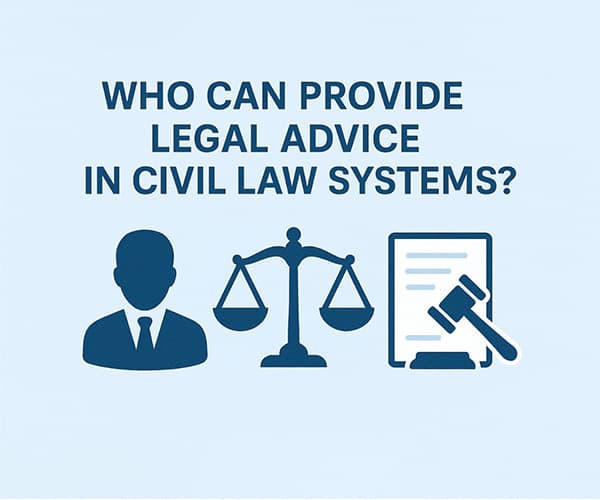Who Can Provide Legal Advice in Civil Law Systems? Full Legal Guide

In countries with civil law systems, many people wonder: who can provide legal advice? Is it only lawyers, or can notaries, paralegals, and legal aid bodies also guide you? This full guide by VakeelSaab explains the role of Civil Lawyers in India, legal advisors, and other entities that can provide civil law legal advice and representation.
Civil law systems (followed in India, most of Europe, and many other countries) are based on codified laws, unlike common law systems where precedent plays a larger role. If you are dealing with disputes like property issues, contracts, inheritance, or family matters, you need to know who can provide legal advice in civil law systems. This blog covers the different types of civil law legal advice providers, including Civil Lawyers in Delhi, notaries, paralegals, legal aid services, and public defenders.
Who Can Provide Legal Advice in Civil Law Systems?
In civil law jurisdictions, legal advice may be provided by multiple professionals and institutions. However, the scope of their services varies widely. Here are the main categories:
1. Civil Lawyers
Civil Lawyers in India are the primary legal advisors in civil law matters such as contracts, torts, family disputes, property issues, and succession. They offer:
- Representation in civil courts
- Drafting and reviewing contracts, wills, and deeds
- Dispute resolution through litigation or mediation
- Civil Lawyer Consultation for individuals and businesses
2. Legal Advisors and Paralegals
Legal advisors in civil law systems may include paralegals and corporate legal officers. While paralegals cannot represent clients in court, they can:
- Assist in research and documentation
- Guide clients on basic civil law procedures
- Support lawyers in preparing case strategies
Paralegal vs Lawyer in Civil Law: A lawyer can argue and represent in court, while a paralegal primarily assists with background work and advisory support.
3. Notaries in Civil Law
Civil law notary services are more significant in civil law countries compared to common law. Notaries authenticate, draft, and certify important legal documents like contracts, property deeds, and succession agreements.
4. Community Legal Centres & Legal Aid
Many civil law jurisdictions provide legal aid in civil law countries through community legal centres, NGOs, and statutory bodies. In India, NALSA free legal advice (National Legal Services Authority) and state legal services authorities assist people who cannot afford private lawyers.
5. Public Defenders and Court Support
Though more common in criminal cases, public defenders in civil law countries may also provide representation in certain cases. Additionally, support through court UK type services exist in other jurisdictions, where volunteers guide individuals representing themselves.
Legal Services Authorities Act in India
The Legal Services Authorities Act, 1987 established a framework for free legal aid in India. Under this law, individuals below a certain income level, women, children, SC/ST communities, and disabled persons are entitled to free civil law legal advice and representation.
Civil Law Legal Representation Without a Lawyer
In some civil law jurisdictions, individuals may represent themselves in minor cases. However, without professional guidance, this carries risks. Even in such cases, VakeelSaab recommends at least a Civil Lawyer Consultation for drafting pleadings and understanding procedure.
Why Consult Civil Lawyers in India?
While multiple professionals may provide legal guidance, Civil Lawyers in Delhi and across India remain the most reliable source for:
- Complex property and family disputes
- Drafting enforceable contracts
- Inheritance and succession cases
- Commercial and corporate civil matters
With VakeelSaab’s Civil Lawyer Consultation, you can avoid costly mistakes and secure your rights effectively.
Frequently Asked Questions (FAQ)
Who can give legal advice in civil law systems?
Primarily lawyers, but also notaries, paralegals, and legal aid services depending on the jurisdiction.
What role do notaries play in civil law?
They authenticate and certify property transactions, contracts, and inheritance agreements, playing a bigger role than in common law systems.
What is NALSA free legal advice in India?
NALSA (National Legal Services Authority) provides free civil law legal aid and representation to eligible individuals under the Legal Services Authorities Act.
Can I represent myself in civil law cases?
Yes, but it’s not recommended. Even in simple matters, consulting a Civil Lawyer in India provides better legal security.
What is the difference between paralegal and lawyer in civil law?
A lawyer can represent clients in court and provide legal opinions. A paralegal assists with drafting, research, and procedural guidance but cannot appear in court.
Need guidance on civil law disputes? VakeelSaab connects you with experienced Civil Lawyers in India and Civil Lawyers in Delhi. From property disputes to succession cases, our experts provide reliable civil lawyer consultation online and offline. Book your consultation today and protect your civil rights with confidence.
Related Articles
The Importance of Consulting a Property Lawyer for Real Estate Issues
Blog
How to File a POCSO Complaint in India: Step-by-Step Legal Process
Blog
What punishments does the law give for giving, taking, or asking for dowry?
Blog
Reasons for the Increasing Divorce Rates in India
Blog
What is a Special Leave Petition? Meaning, Features, Process & & Who Can File?
Blog
What Is the Difference Between Mutual Divorce and Contested Divorce?
Blog